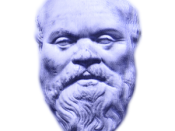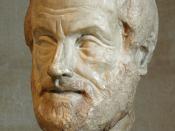After the death of Plato in 347 BC, Aristotle moved to Assos, or city in Asia Minor, where a friend of his, Hemias was the ruler. There he counseled Hermias and married his niece and adopted daughter Pythias. After Hermias was captured and executed by the Persians, Aristotle went to Pella, the Mededonian capital, where he became the tutor to the Kings young son, Alexander, later known as Alexander the Great. In 335 BC, when Alexander became King, Aristotle returned to Athens and established his own school, The Lyceum. Because much of the discussion in his school took place while teachers and students were walking about Lyceum grounds, Aristotle's school came to be know at the Peripatetic ("Walking" or "Strolling") school. Upon the death of Alexander in 323 BC, strong anti-Macedonian feeling developed in Athens, and Aristotle retired to a family estate in Euboea. He died there the following year.
Aristotle, like Plato, made regular use of the dialogue in his earliest years at the Academy. But lacking Plato's imaginative gifts, he probably never found the congenial. Apart from a few fragments in the works of later writes, his dialogues have been wholly lost. Aristotle also wrote some short technical notes. One was "a dictionary of philosophic terms and a summary of the doctrines of Pythagoras", (Aristotle The Man And His Work pg. 71). Only a few brief excepts have survived. Still extant, however, are Aristotle's lecture notes for carefully outlined courses treating almost ever branch of knowledge and art. The texts of which Aristotle's reputation rests are largely based on these lecture notes, which were collected and arranged by later editors.
Among the tests are treatises on logic, called Organon ("instrument"), "they provided the means by which positive knowledge is to be attained ".


